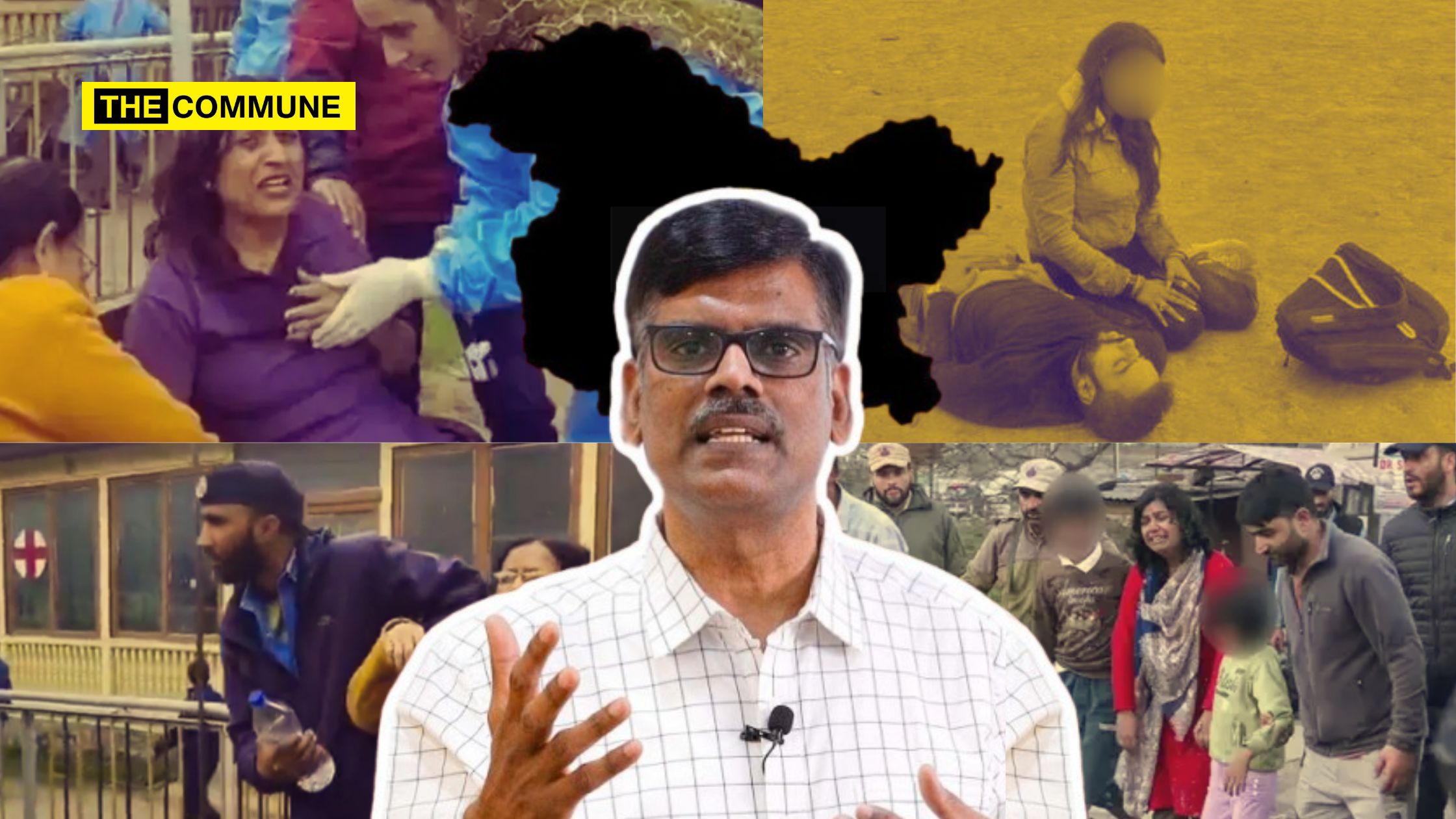
It seems that it’s not just Dravidianists who speak out against India and receive support from within the state and the nation; the anti-Indian agenda seems to find backing across the country. P. R. Sundar, an Indian-born Tamil Dravidianist and Singapore citizen, who works as a stockbroker, appears to have a problem with India’s actions against terrorism, especially in the wake of the horrific 22 April Pahalgam terror attacks. Sundar aligns himself with leftist narratives in the country, pushing the “terror has no religion” rhetoric, and shamelessly implicates both the Indian Army and the Central Government for the attack.
Right at the beginning of his video, Sundar’s first agenda is to suggest that the Indian army might have colluded with the terrorists. He uses a poem to indirectly make this point, saying, “A country that waged war with an enemy country has been defeated. A soldier from that defeated country recites this poem. What does he say? He says, ‘Our country’s fort has walls that are 25 to 30 feet high; only a bird can enter and no other can.” He continued, “The guards around the fort, stands so close that only the wind can pass between them. This is the beauty of the poem. After describing all these one by one, he says despite all the security, why did we lose? Because there was a tunnel that led directly to the king’s room. The soldier guarding the fort took a bribe and allowed the enemy soldiers through the tunnel, who then went straight to the king’s room and killed him.”
By quoting this story, Sundar appears to be implicating the Indian Army, as well as attacking the government and suggesting that India is so corrupt it cannot effectively confront any external threat. It’s a logic-lacking argument against terrorism. Is he implying that the focus should only be on internal matters, neglecting the fight against terrorism altogether was a brooder question?
Sundar then proceeds to ridicule and undermine India’s military capabilities by quoting reports, stating that between 1951 and 2021, nearly 2,400 military aircraft have crashed — not during war, but during peacetime operations and routine training. He mocks the reliability of Indian military equipment by emphasizing that even without facing the enemy, hundreds of aircraft — including a significant number of fighter jets — have been lost. He adds, “Each fighter jet costs between ₹2,000 to ₹3,000 crore. When I spoke with a foreign friend, he remarked sarcastically, ‘The fighter jets in your country are not aircrafts. Those are just flying coffins.’” Sundar goes further, invoking the “coffin scam” and past honey-trap cases involving Indian officials, as a way to brand the entire system corrupt and untrustworthy. He uses this narrative to lecture India on corruption, completely diverting attention from the very real and pressing issue of terrorism.
This line of argument mirrors the tactics used by other known Dravidianist voices like self-styled journalist Senthilvel, who similarly attempted to deflect from condemning the brutal Islamic terrorist attack — an attack that dealt a heavy blow to Kashmir’s budding tourism economy and pushed many locals back toward poverty.
Sundar then reinforces the Congress-Dravidianist line by pushing the worn-out narrative that “terror has no religion,” even in the face of overwhelming evidence from the Pahalgam terror attack. Victims of the attack reported that the terrorists explicitly targeted tourists based on religion — asking some to recite Islamic verses and even checking for circumcision by forcing men to remove their pants. The attackers were not just indiscriminately violent; they were methodically selecting victims based on faith.
Yet, despite these horrifying details, Sundar and others pushing this narrative expect the nation to remain silent or suppress the truth in order to maintain political correctness. What they fail to acknowledge is that not a single Indian voice blamed Indian Muslims. In fact, many Kashmiri Muslims risked their own safety to help survivors — and they were embraced as fellow citizens, not as a separate community. However, agenda-driven figures like Sundar continue to advance divisive rhetoric, playing directly into the hands of the terrorists’ objective to stoke a Hindu-Muslim divide and weaken India from within.
Sundar then shifted focus to lecture India on how to eradicate poverty in Kashmir, asserting that youth radicalization stems from economic deprivation. But what he fails to grasp, comfortably seated in Singapore and clearly out of touch with current ground realities, is that Kashmir’s situation has evolved significantly — and radicalization isn’t merely an outcome of poverty, but of deeply rooted ideological indoctrination.
He went on to criticize India’s diplomatic steps, such as suspending trade with Pakistan and leveraging the Indus Water Treaty, questioning what tangible benefits these actions bring. He argued that such moves unjustly punish Pakistani citizens for the actions of terrorists. Contrastingly, only the people of Pakistan can bring about regime change, and India should rely on public pressure within Pakistan to demand that their government stop sheltering terrorists.
“Daily at the Wagah border they would conduct something (beating retreat ceremony) that has been stopped. That has been stopped many times, now you’re stopping it again. It will again be started a few days later. Sending back diplomats, Pakistanis in India. Instead of punishing the terrorists, whom are we punishing? We’re telling people who came from Pakistan for medical help to go back in 24-48 hours. What did that patient do? Did that patient support that terrorist? Okay, you’ve stopped the Indus River. It’s going to affect their agriculture. The farmers there will live in poverty. So, targeting patients and farmers is your counter attack? He’s killed a tourist and he’s not in the right mind. What’s the difference between them and us? We’re also targeting unarmed patients and farmers. Are we targeting Pakistani Army? What have they done by targeting the Pakistani Army?“, he says in the video.
Ironically, just moments earlier, he had praised American citizens for standing up against U.S. foreign policy during the Vietnam War, specifically citing the iconic image of the “napalm girl” as a turning point in public opinion. He commended American citizens for opposing their government. Yet, in the same breath, he criticizes India for trying to pressure Pakistani citizens into demanding accountability from their own regime. This blatant contradiction exposes his hypocrisy applauding civic activism in one context while condemning it in another, solely because it doesn’t fit his anti-India narrative.
Finally, Sundar attempts to wrap up his video with a hollow disclaimer, saying, “I have not come to speak against any party. I am speaking as someone born and raised in this country. By race, I am Indian, so I have a special interest in India. I speak only for the public, with no political affiliation or hidden agenda.” But his own words betray that claim. Throughout the video, he consciously promotes narratives that attack the Indian government’s anti-terror measures, while deliberately avoiding any direct condemnation of Islamic terrorism — making his supposed neutrality ring hollow.
Subscribe to our channels on Telegram, WhatsApp, and Instagram and get the best stories of the day delivered to you personally.




